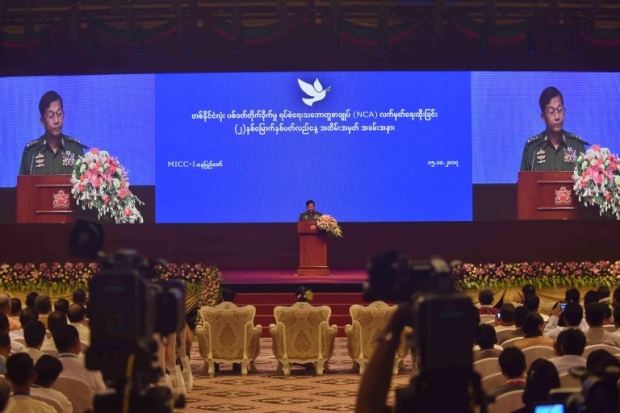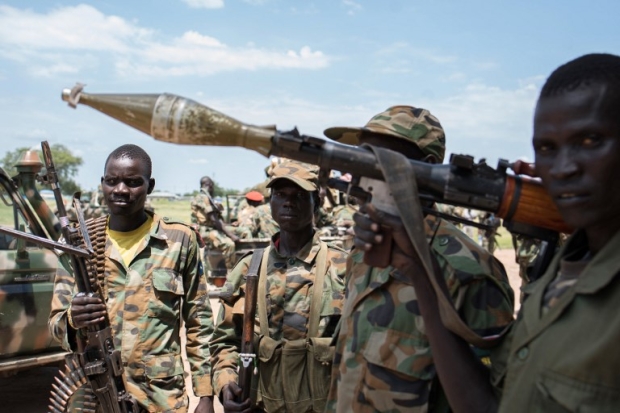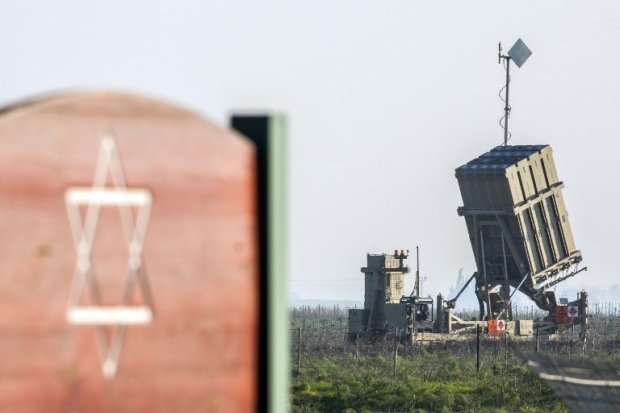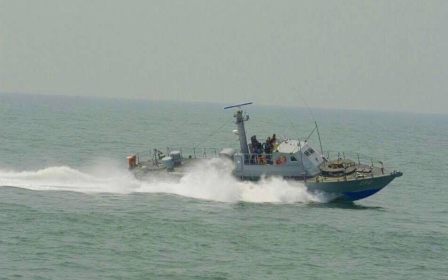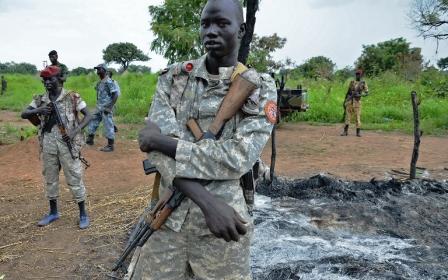Israel's badly kept secret: Selling arms to regimes at war
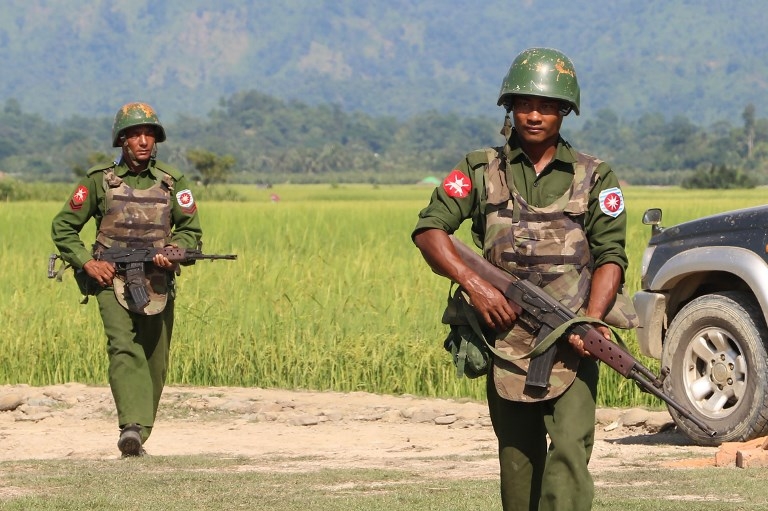
Israel prides itself as being a free, democratic society, part of the Western world. Well not exactly. At least when it comes to two significant areas.
One, towering above all, is the occupation of the West Bank under the iron fist of the Israeli military and depriving its Palestinian residents of basic civil and democratic rights.
Military exports are somewhat of a sacred cow in Israel. They are in the Israeli DNA
The second area in which the lack of transparency is evident and the government has tried to quash information is military-security exports. Here, too, the censor is omnipresent and suppresses any information that can potentially embarrass the government and security establishment for its weapon sales to dictators, rogue regimes, violators of human rights and other dubious governments.
Myanmar
Myanmar is a case in point. In September, a group of Israeli human rights activists petitioned the High Court of Justice to stop weapon sales to that country military’s junta, which, essentially, is still in power despite elections in 2015.
According to human rights groups and UN reports, the Myanmar army is involved in systemic ethnical cleansing and war crimes against the Rohingya (a Muslim minority). It has been reported that almost half a million people escaped to neighbouring Bangladesh after thousands were killed and raped and villages were set on fire.
For years, Israel sold weapons to Myanmar, including listening equipment, communications gear and patrol boats manufactured by Israeli Aerospace Industries (IAI). Also, Tar Ideals Concepts, an Israeli company, trained Myanmar Special Forces. Asked for its response, the company didn't answer.
Successive Israeli governments were ashamed of these deals but encouraged arms dealers and state-owned industries to continue making them. At the same time, they used the military censor to suppress the information.
So how do we know about all these deals? Because the Myanmar junta proudly boasted about them on its official websites and posted photos of its chiefs visiting Israel. These included meetings in September 2015 between Sr. Gen. Min Aung Hlaing, the commander-in-chief of the Myanmar Armed Forces, which acts independently of the civilian government, along with other senior officers of the military junta, and President Reuven Rivlin, the Israeli army chief Gadi Eisenkot and the heads of Israel’s security services and senior officials in its arms industry.
Hlaing even wrote on his Facebook page that he and his colleagues had visited Israel Aerospace Industries near Tel Aviv and other defence firms.
China ties
Recently, I learned that Commtact, an Israeli manufacturer of communication gear for drones, has sold equipment installed on Chinese-made drones operated by the Myanmar army via Elul (an Israeli arms broker). Commtact is a subsidiary of the Israeli drone manufacturer Aeronautics Defense Systems. The Israeli government has been particularly sensitive about this deal, not because it opposes sales to Myanmar, but because it feared the link to Chinese drones would anger the US.
Beginning in the late 1970s, long before the establishment of diplomatic ties between Israel and China, Israeli defence contractors secretly equipped China's army, with government approval. In the last decade, however, Israel stopped military sales to China under pressure from consecutive US administrations.
It can only be assumed that the suspension of Israeli sales is temporary, resulting from public pressure at home, especially by civil rights groups
Elul didn't return calls for comment, but a spokesman for Commatc and Aeronautics confirmed that the company had sold equipment to Myanmar "according to Defence Ministry regulations and with its approval." He added, however, that the Defence Ministry had recently changed its policy and suspended all licenses to all Israeli companies, including Commtact, that permit dealings with Myanmar.
It's worth noting that the ministry didn't issue any statement in this regard and hoped to keep the move under wraps. The ministry refused to elaborate, saying only: "We don't comment on export issues." The secrecy is aimed at not angering Myanmar, with the hope that sooner or later the ban will be lifted and business resumed.
It can only be assumed that the suspension of Israeli sales is temporary, resulting from public pressure at home, especially by civil rights groups. Some of them, in September, appealed to the Supreme Court to order the Defence Ministry to stop its sales to Myanmar and thus follow US and EU policies that have imposed an arms embargo on the Southeast Asian country. The state opposed, and the court rejected the appeal.
All of the deliberations were behind closed doors, indicating that, in Israel, it's not only the censor, but also the courts, that are closing ranks with the security establishment when it comes to arms sales.
Arms to dictators
Military exports are somewhat of a sacred cow in Israel. They are in the Israeli DNA, and the public generally supports the government’s policy and prefers not to hear about it even if it stands in sharp contrast to universal morality, human rights and ethics.
Israeli arms exports to more than 100 countries on five continents totaled $6 billion in 2016. This represents only 6-7 percent of the total Israeli exports of goods and services, but the contribution of security contractors is not limited to exports. They are the primary suppliers of weapons to the Israel Defence Forces (IDF) and employ some 100,000 workers, making them a significant factor in allowing Israel’s economy to prosper.
The customers can be divided into three groups. The first and the biggest market are countries with which Israel has diplomatic relations such as the US, the EU, India, Singapore, and Azerbaijan.
The second group consists of countries with which Israel has diplomatic relations but are ruled by dictators or are involved in civil wars or engage in abuses of human rights, such as Myanmar or, in the past, countries in South and Central America as well as Africa.
Israeli arms dealers sold weapons to both sides during the war between Ethiopia and Eritrea. But the most worrisome case in the Israeli exports to Africa was in South Sudan. Israel continued to supply arms to that nation even after the bloody civil war erupted there. Only recently under strong local media and foreign human rights groups the MoD announced that it had ceased all military sales to South Sudan.
Arms sales as diplomacy
Here, in this second category, too, the censor has stepped in to prevent publication of defence deals, as is the case with Azerbaijan, which, because of its border with Iran, is considered strategically important.
The taboo on this topic was broken in February when Azeri President Ilham Aliyev publicly acknowledged that his country had clinched deals with Israel valued at $5bn over the last two decades. In so doing, Aliyev surprised Netanyahu, who was visiting Azerbaijan at the time. Alongside the US, India and the EU, the Caucasian nation is one of the biggest markets for Israeli military toys.
The third category of countries benefiting from advanced Israeli weapons and technologies ‒ "battle proven" after being used by the IDF ‒ are those that don't have diplomatic relations with Israel. These are mainly Arab and Muslim nations.
Here, the deals are aimed not only at financial rewards but also to gain a foothold in the Arab world and to receive payment with intelligence information or other favours.
In the 1980s, Israel sold US-made Skyhawk jets that had been put out of service by the Israeli Air Force (IAF) to Indonesia, the biggest Muslim country in the world. The sale was approved by the US. In return, Indonesia gave Israel favours, including allowing Israeli experts to learn about sophisticated Soviet-made weapons being used by its Arab enemies.
In past years, Israeli weapons and technologies have been used to help Jordan (Israeli helicopters and drones on loan) and Egypt (intelligence information and Israeli drones occasionally attacking Islamic State positions in Sinai).
Because Jordan and Egypt have diplomatic relations with Israel, on the surface, reports about the special security-military ties shouldn't be a problem. But, once again, the censor is allowing information to be reported locally, only if foreign news media already have reported about it.
Gulf deals
Another important market for Israeli military technologies is the United Arab Emirates, led by Abu Dhabi and, according to reports which never been confirmed, Saudi Arabia.
The reports claim that Israeli high-tech companies have clinched deals to supply the kingdom with intelligence equipment and that Saudi Arabia is considering buying Israel's anti-missile system called "Iron Dome". It is worth noting that social media in the Arab world have persistently spread rumours that Crown Prince Mohammed Bin Salman recently visited Israel. Saudi spokespersons denied it.
For several years, the censor has used its iron fist to prevent any reports in the Israeli media about sales to the Arab world. This attitude proved to be absurd and ridiculous because the main broker in the "secret" deals, an Israeli arms dealer called Mati Kochavi, revealed the deals with Abu Dhabi in a public seminar in Singapore out of sheer self-importance and ego.
The English writer, Samuel Johnson, wrote that "patriotism is the last refuge of the scoundrel." It can be said that Israel’s Defence Ministry is quick to use “security reasons” as a pretext to justify every evil possible that is carried out by unscrupulous arms dealers, corrupt defence contractors and ruthless dictators.
In the first two decades after gaining its independence in 1948 Israel hoped to be a light unto the nations, but unfortunately has become a weapons supplier to dubious regimes.
- Yossi Melman is an Israeli security and intelligence commentator and co-author of Spies Against Armageddon.
The views expressed in this article belong to the author and do not necessarily reflect the editorial policy of Middle East Eye.
Photo: In this photograph taken on 21 October 2016, Myanmar army soldiers patrol a village in Maungdaw located in Rakhine State as security operation continue following the 9 October 2016 attacks by armed militants. (AFP)
This article is available in French on Middle East Eye French edition.
Stay informed with MEE's newsletters
Sign up to get the latest alerts, insights and analysis, starting with Turkey Unpacked
Middle East Eye delivers independent and unrivalled coverage and analysis of the Middle East, North Africa and beyond. To learn more about republishing this content and the associated fees, please fill out this form. More about MEE can be found here.



